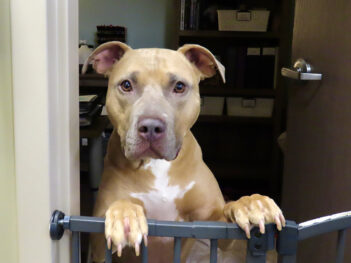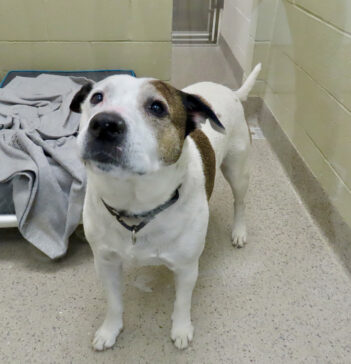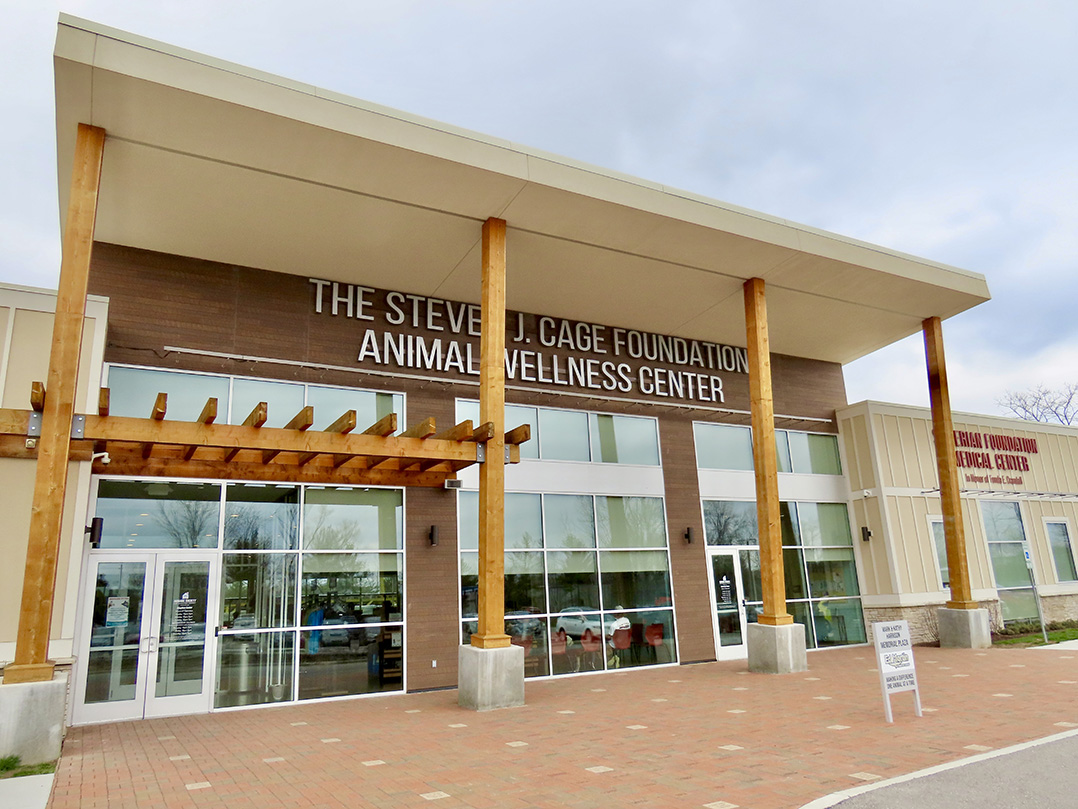At the Humane Society for Hamilton County, there are dogs everywhere. The shelter’s 124 kennels are filled, along with dog-visiting rooms, and even administrative offices. In all these spaces, dog after dog after dog watches people walk past. Some are eager for attention, with smiles and wagging tails. Others seem defeated, curled up in a corner. Still others are frustrated, and bark unhappily.
They’re all “babies” to HSHC President and CEO Rebecca Stevens, and her goal is to get homes for each of them. But not just any home — a good home; a forever home.
That’s challenging, though, because the Hamilton County shelter isn’t the only one bursting with dogs right now. And other shelters make it easy to adopt, but difficult to surrender. That’s part of the problem, Stevens said.

“What I’ve discovered over the last few months is that the biggest part of our issue is not animals not being spayed or neutered. We’re not getting a bunch of puppies and kittens,” she said. “What we’re getting are a lot of Marion County animals, and Marion County residents that are finding animals in that county.”
But the shelters there have started to require an appointment for dropping off a dog, even to bring in a stray someone found on the street.
“That puts people in a precarious position,” Stevens said, “They tried to do a good thing, and now they’re faced with, ‘What do I do with this animal?’”
She said many of those people are told to try shelters outside of Marion County, and some are showing up at the Hamilton County shelter, desperate to find someone who can take in a stray that they simply wanted to keep safe. The HSHC will always take Hamilton County dogs, because that’s its mission and what it’s contracted to do. But it can — and does — say no to dogs brought in from other counties if there’s no space. But, Stevens said, the people who bring dogs here don’t want to hear that.
“Now, I’m dealing with the customer-service impact on my people,” she said. “They’re the ones being yelled at (and) spit on.”
Sometimes the person who is turned away at the counter simply lets a dog go in the parking lot, so it becomes the shelter’s problem, anyway.
But why are there so many dogs? Stevens said some of it might be people surrendering pets they adopted during the pandemic, but now don’t have time for the dog anymore. While spaying and neutering is important, they’re not seeing a big influx of puppies, so that doesn’t seem to be the issue, either. Stevens says the root of the problem is a lack of commitment.

“It all starts with ultimately the original owner,” she said. “And that’s irrespective of county or anywhere. Over the years, there is an increased lack of compassion and commitment and dedication.”
There are several ways people can help with the influx of dogs at the shelter, Stevens said. First and foremost, when you’re thinking about adding a dog to your family, hold off on going to a breeder or one of the other shelters that doesn’t charge adoption fees or provide any screenings. Check out the HSHC first, she said, because the best dog for you could be right there.
“We still charge an adoption fee,” Stevens said. “You have to still fill out an application; you have to jump through some hoops. So, at the end of the day, we’re not moving out as many competitively because it’s harder. It’s better in the long run for everybody, but it is harder. And so, my message is: this is a good thing. You want to know before you go home with a dog if it’s going to be OK with your dog, or your kids, or your cat, right? I mean, isn’t that a win for everybody? So, take a little extra time. It’s forever; it’s a family member.”
If someone can’t adopt, Stevens said the HSHC needs foster homes for dogs recovering from surgery, for example, or a quiet place for a dog or cat to nurse a new litter. One other very important way people can help is to not surrender their pet to a shelter.
“If you’re having a problem, we offer free behavior counseling,” Stevens said. “You could call up here, and somebody will talk you through how to help you keep your dog from barking or jumping up on people or counter surfing. None of that is unsurmountable. That’s diversion — finding a way for people to keep their animals that really want to, and we’re all about it. What we won’t do is make it somebody else’s problem.”
More than just a shelter
The Humane Society for Hamilton County has contracts with various county governments that cover a seven-day hold on pets brought in, but the shelter offers much more than that, and all the additional services are paid for through donations.
One of the services is Pets Healing Vets, an emotional-support pet program for Indiana veterans. HSHC President and CEO Rebecca Stevens said any veteran in the state — not just Hamilton County — is eligible. They just need a medical referral showing they would benefit from a companion animal. The program matches those veterans with pets that best meet their needs. If it’s a dog, then training is provided free of charge.
“What is unique, and still to this day, I haven’t found another similar program that does this. is that we will fund 100 percent of anything that’s necessary for that veteran to have an animal,” Stevens said.
That includes food and veterinary care, if needed. Not all the approximately 40 veterans in the program take that financial assistance, Stevens said — only those who really need it.
The shelter also offers youth programs, providing in-school education about proper pet care, and another program that selects at-risk youth to help train dogs and, at the same time, achieve a sense of accomplishment while helping a new friend learn new skills.





